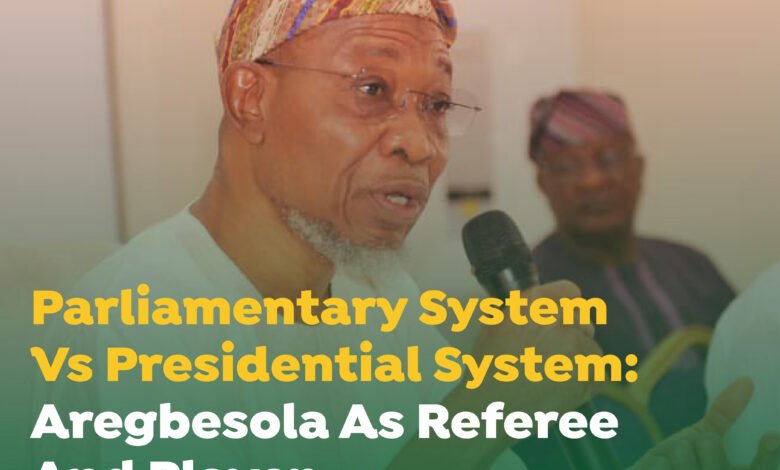[OPINION] Parliamentary System Vs Presidential System: Aregbesola as Referee and Player

Like many former government officials, Ogbeni Rauf Aregbesola, who served in the Buhari administration as Interior Minister, has become vocal about insights on how to reshape the institutions of the state. Naturally, these insights prescribe recommendations to limit or completely remove the powers and privileges available to him while he was in government. In other words, he wants to close the door to a room he dwelled in for eight years to others because, after leaving, he has now discovered a monster under the bed.
Speaking recently at the national dialogue on the constitutional future of Nigeria in honor of Ben Nwabueze, a celebrated constitutional lawyer, Engineer Aregbesola, who served as Osun Governor for two terms, called for the scrap of the presidential system of government, which he regarded as too expensive and incapable of helping Nigeria overcome its governance challenges.
In its place, he called for the restoration of the parliamentary system of government in which representation, according to him, would be done based on ‘production’ not ‘residence’. The latter point is a head-scratcher. Like a line taken directly from Obi’s ‘consumption to production’ manifesto in the last election, Ogbeni said the following:
“People are more engaged in production. Productive acts and those engaged in production should be given the opportunity to elect their best. We are united more through production. So, therefore, in seeking appropriate democratic representation, let us look at production as a basis of representation.”
Taken at face value, it seems Ogbeni wishes for a rank-system in this new democracy he wants implemented in Nigeria. One in which ‘more productive’ citizens and regions are ranked above ‘less productive’ ones. But productivity as determined by what? Ogbeni may need another platform to expound on this proposition.
His consideration of the parliamentary system of government as better than the presidential system is hinged on the issues of cost and Nigeria’s complex diversity. Like many, he thinks the presidential system is too expensive and centralizes power in an unsustainable way given Nigeria’s diversity and colorful history of power contests.
The arguments are not without merit, even if some question Aregbesola’s motivations. He is, after all, one of the longest beneficiaries of the said presidential system and didn’t seem to have a problem when the same system enabled his frequent and expensive expeditions to Osun State in a long convoy of armed officials to showcase ‘federal might’ in his political dominance tussle with the then-governor.
His hypocrisy aside, experts and political analysts have challenged the idea that a mere transition to the parliamentary system of government would reduce Nigeria’s government running costs. One of them, Etim Etim, summarized the argument in a column by saying “any system could be very expensive, depending on how you operate it.”
Additionally, regarding Nigeria’s complexity, Ogbeni appears to suffer from ‘rosy retrospection’, which causes an over-romanticization of the past. Nigeria’s experience with the parliamentary system of government was not devoid of chaos. The system did not blunt the divisive tendencies that animate political discourse. In fact, some argued it enabled it, with scandalous conflict over population size, regional seat allocation, and the fate of ethnic minorities.
Ogbeni unwittingly demonstrated this with his confusing ‘representation by productivity’ theory, which may sound catchy like most fanciful slogans but is sure to spark controversy and chaos in practice. No doubt that the former governor has refocused attention on an important issue and expanded a debate worth having. However, those on his side may benefit from a more credible representative. In the eyes of many Nigerians, Ogbeni attempts to play referee and player in the quest to raise his sliding political stock. It is a situation that greatly undermines him.
By Saheed Animashaun Olajide
Do you have an opinion article you would like to publish? Send to opinions@greenpress.ng.





